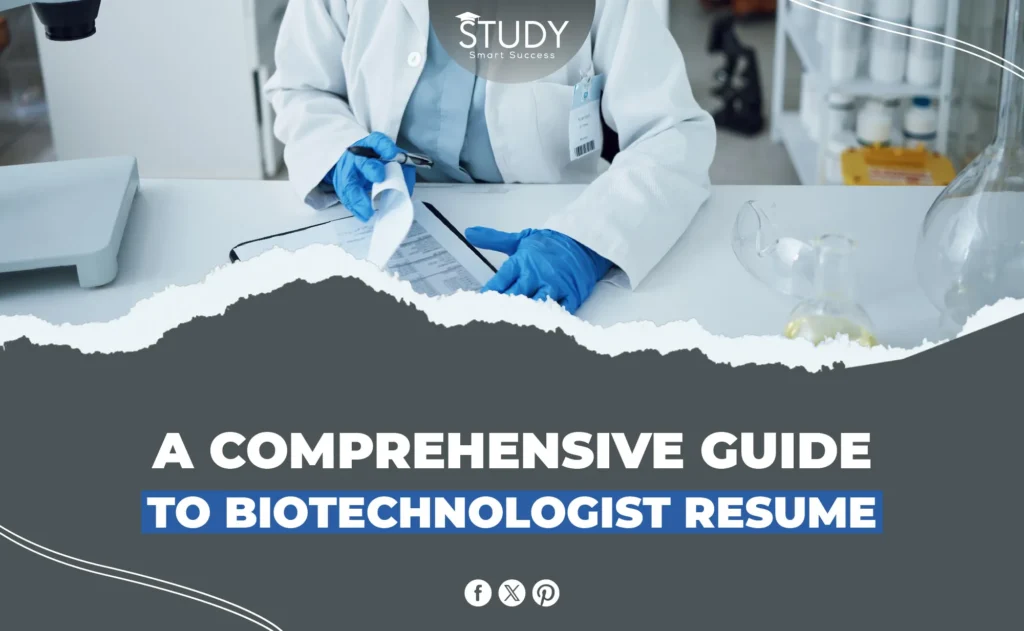Introduction
An effective biotechnologist resume is crucial for entering or advancing within the biotechnology field. This guide elucidates the elements contributing to an effective biotechnologist’s CV and offers strategies for presenting qualifications to prospective employers. This article will guide formatting a resume to emphasize skills and accomplishments effectively.
Read more about what an ecologist is.
The Role of a Biotechnologist
- Research and Development: Biotechnologists often support the development of concepts and execute scientific research projects. They create new medical, agricultural, and environmental technology and goods.
- Data Analysis: Much of the work involves analyzing complex research data. Biotechnologists must accurately understand findings to advance or create new procedures and products.
- Collaboration: Scientific development and technical innovation call for cooperation among researchers, specialists in the field, and industry professionals. Interdisciplinary teams address difficult problems by combining several areas of knowledge; hence, effective communication is quite important.
- Quality Control: It is imperative to make sure objects satisfy safety regulations and quality requirements. Product safety and effectiveness depend on strict testing, quality assurance, and industry standards followed.
- Technical Writing: Sharing discoveries with stakeholders and scientists calls for presentations, research papers, and reports. One must also adapt to different audiences, write properly, and correctly interpret and present statistics.
- Equipment Maintenance: Biotechnologists need to maintain lab tools so that research can be done safely and quickly. Regular checks, technical troubleshooting, and repair plans are needed to prevent equipment from breaking down and ensure accurate experiment results.
Crafting Your Resume: Essential Components
- Header: The first portion of your resume should include your name, professional email address, and phone number. You can describe your work background using LinkedIn or a company website.
- Objective Statement or Summary: This section should be a brief pitch to the company outlining your desired career path and unique value. Customize this statement to fit the specifics of the employment you seek so that it is evident why you are the most qualified applicant.
- Professional Experience: List your biotechnological duties and accomplishments from previous positions. Use explicit verbs like “developed,” “analyzed,” or “synthesized,” and describe positive project outcomes like patents or process improvements, trying to quantify them.
- Education and Certifications: List your education starting with your most recent degree. Include any field-related courses, seminars, or workshops to demonstrate your dedication to learning. CRISPR-Cas9 or Bioinformatics Specialist diplomas are appealing.
- Skills Section: Classify your skills as technical and soft. Listing biotechnology lab processes, computer languages, and software skills. Collaboration and results-oriented environments require communication, leadership, and problem-solving.
Additional Sections to Enhance Your Resume
- Publications and Patents: If you have any, mention your published research papers or patents. This section of your resume will look better if you demonstrate how you have added to scientific knowledge and fresh ideas.
- Professional Affiliations: Membership in professional organizations such as the American Society for Biochemistry and Molecular Biology (ASBMB) indicates active participation in the biotechnology community. Membership in the Biotechnology Innovation Organization (BIO) engages individuals in biotechnology.
- Conferences and Workshops: Discuss the meetings, symposiums, and specialty seminars you have attended in your field. Consider any speeches or poster sessions you’ve conducted that demonstrate your ability to explain complex ideas succinctly.
Tailoring Your Resume for Different Biotechnologist Roles
Your CV must be customized to stand out in the biotechnologist employment market. Read the description before applying for research, clinical, or industrial jobs. This map indicates employers’ necessary skills and experiences. Resume keywords and phrases should relate to important jobs or qualifications.
For research, demonstrate experimental design, data analysis, and lab abilities. Mention renowned scientists’ papers or partnerships. Clinicians should prioritize quality control, regulatory compliance, and patient-centered applications. Showcase industry compliance and clinical trial contributions.
Promote industrial scale-up, product development, and teamwork. Applications benefit from understanding project management and industrial equipment. Your resume passes ATS and attracts hiring managers with job listing keywords. Personalizing your CV for each position displays your suitability and contribution.
Common Mistakes to Avoid
- Overlooking Customization: Using the same resume for every job application might look like it was made for everyone. Your resume should always be tailored to the job you want.
- Including Irrelevant Information: Your resume features a useful list of abilities and expertise. To maintain the emphasis on the biotechnologist’s employment, leave out details unrelated directly to it.
- Neglecting Quantifiable Achievements: Your efforts could be less important if you enumerate chores without offering any statistics to back them up. Show your achievements with numbers, such as better project results or efficiency percentages.
- Ignoring Formatting and Clarity: A messy or difficult-to-read CV could turn off companies because they need assistance locating the required information. Easily navigable are clear, orderly CVs. Separated should be skills, knowledge, and professional experience. Bullet points highlight important duties and accomplishments, improving readability and differentiating qualifications.
- Missing Proofreading: Grammatical mistakes and resume typos can project a poor first impression and indicate a lack of attention to detail. Proofreading your CV will help you avoid mistakes. Have a peer or mentor check it as well; a fresh set of eyes might identify issues and provide ideas for development.
- Overemphasizing Soft Skills: Though they are vital, soft skills shouldn’t limit your technical ability in fields like biotechnology. Balance both, and ensure your professional background distinguishes you.
Conclusion
In the fast-paced field of biotechnology, keeping your resume up-to-date and perfect is essential. Your resume should change as you get more skills, experiences, and accomplishments. It should show how you’ve grown as a worker. Sticking to the tips in this blog post will help you make a strong resume that shows off your skills and makes you stand out in the challenging biotech field.


